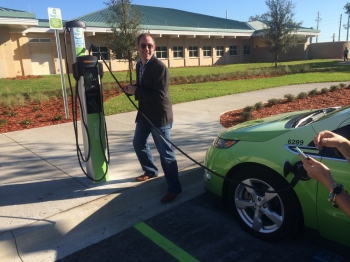
Wanda Forrest, Coordinator of the Northern Florida Clean Fuels Coalition in Jacksonville, and Mike Scarpino, of Clean Cities, standing next to a compressed natural gas vehicle. | Photo courtesy of Clean Cities

An EV charger installed thanks to the North Florida Clean Fuels' new ChargeWell program. | Photo courtesy of Clean Cities
The Energy Department’s Clean Cities program combines technical expertise from our national laboratories with local expertise from our regional coalitions. This week, we welcomed the Northern Florida Clean Fuels Coalition in Jacksonville into our network of nearly 100 coalitions across the country. As part of Clean Cities, this group will continue to minimize the use of petroleum in transportation throughout their area.
This process is so rigorous that the program’s last designation was in 2014, when we brought in North Florida’s neighbor, Tampa Bay Clean Cities. When a community wants to establish a coalition, it gathers together stakeholders interested in alternative fuels and fuel efficiency, including vehicle fleets, city governments, fuel suppliers, electric and natural gas utilities, dealerships, and other non-profit organizations. This group chooses a coordinator, who leads the effort to understand the local market and demand for advanced vehicles and alternative fuels. If the conditions aren’t right, even the best of efforts will flounder. Based on this analysis, the group sets goals and action steps with support from the national Clean Cities program.
The North Florida Clean Fuels Coalition is well on its way towards achieving its ambitious goals. With 38 stakeholders, 2,000 alternative fuel vehicles, and 80 alternative fueling and charging stations in the region, they’re starting with a solid base. Working with 25 organizations that use alternative fuels or vehicles, in 2014 alone they reduced more than 2.4 million gasoline gallon equivalents of petroleum.
The coalition has enabled a number of these efforts through $5 million in incentives distributed to local fleets and infrastructure providers.
The Jacksonville Transit Authority plans to adopt more than 100 compressed natural gas (CNG) buses by 2020 as well as develop a CNG fueling station. St. John’s County is purchasing 130 medium-duty CNG vehicles and has found a developer to build and operate a public CNG fueling station.
The coalition has also supported some seriously innovative projects. They’ve provided funding for the Florida East Coast Railway to test four locomotives that can run on liquefied natural gas, potentially displacing up to 80% of their diesel use. Because the coalition helped the City of Jacksonville purchase compressed natural gas trucks, the city is now exploring producing renewable natural gas from two closed landfills.
In partnership with the local utility JEA, North Florida Clean Fuels launched ChargeWell, an initiative to install 27 plug-in electric vehicle chargers. By offering applicants a free charging station and $7,500 towards installation, the coalition hopes to double access to charging infrastructure in the area. JEA is offering an additional $500-$1,000 incentive for plug-in electric vehicle buyers. The coalition hopes these efforts can further accelerate the market.
On the other end of the spectrum, the North Florida Clean Fuels Coalition is working with the Jacksonville Port Authority to understand the types and ages of trucks that use the port. Based on this data, they hope to launch a Clean Truck program to reduce air pollution from these vehicles. They are also working with shipping companies that are using liquefied natural gas in their container ships.
From plug-in electric vehicles for consumers to the biggest ships, the North Florida Clean Fuels Coalition is already finding creative ways to use less gasoline and diesel in their area. We know that they’ll be a great asset to Clean Cities now and into the future.




